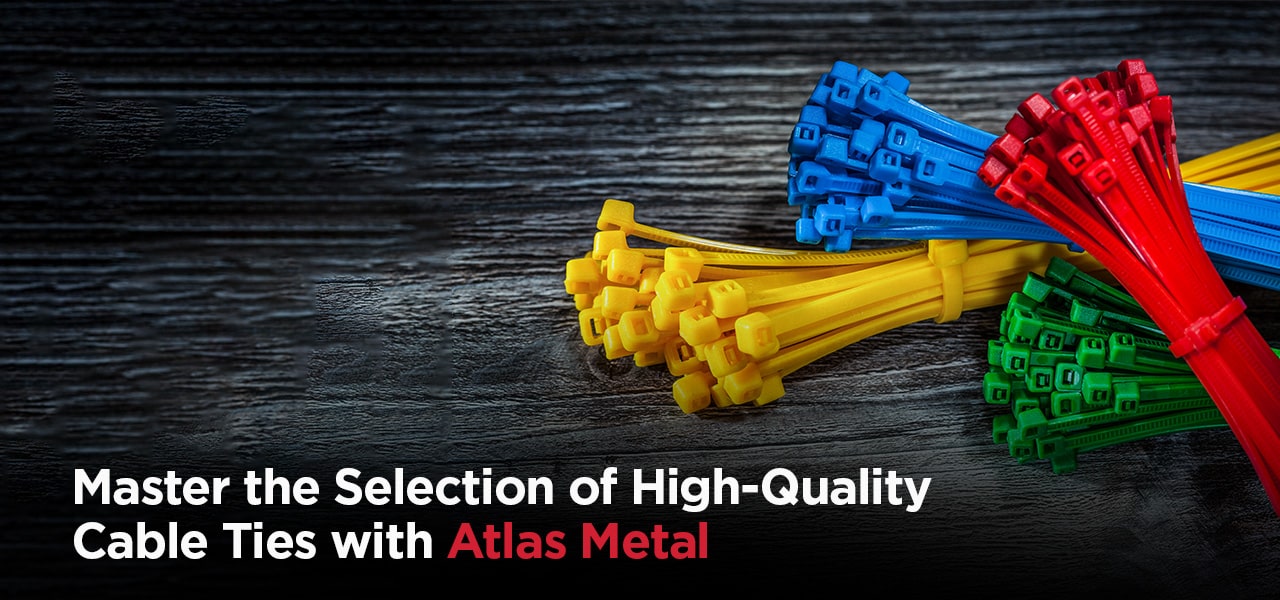|
Getting your Trinity Audio player ready...
|
In a world increasingly driven by excellence and efficiency, the importance of cable ties cannot be ignored. Atlas Metal, a leader in the production of high-quality metal products, presents this comprehensive guide to help you navigate the world of cable ties. This guide is designed to equip you with the knowledge to select the best cable ties for your specific needs, ensuring durability, reliability, and functionality.
Understanding Cable Ties
Cable ties are a type of fastener designed for bundling together wires, cables, and in some cases, other items. They are valued for their ease of use, versatility, and strength. Cable ties come in various sizes, colours, materials, and designs, each serving a unique purpose.
Types of Cable Ties
Cable ties are available in a myriad of types, each designed for specific applications:
- Standard Cable Ties: The most common type, used in everyday applications for bundling wires and cables.
- Releasable Cable Ties: These feature a mechanism that allows for easy release and reuse, ideal for temporary installations or applications requiring frequent changes.
- Stainless Steel Ties: Best for environments with extreme conditions, offering high tensile strength, temperature, and corrosion resistance.
- UV Resistant Ties: Made to withstand prolonged exposure to sunlight, perfect for outdoor use.
- Coloured Ties: Used for easy identification and colour-coding purposes.
Material Considerations
The material of a cable tie plays a crucial role in its properties and suitability for different environments:
Nylon: The most common material, known for its balance between strength and flexibility.
Polypropylene: Polypropylene cable ties are resistant to chemicals and ideal for applications with exposure to acids and bases.
Stainless Steel: Stainless steel cable ties offer superior endurance in high-temperature and corrosive environments.
Speciality Compounds: Including flame-retardant, heat-stabilised, and UV-resistant options, these cable ties serve unique requirements.
How to Choose the Right Cable Tie
The selection of the appropriate cable tie depends on a thorough understanding of the application’s specific needs.
- Application-Specific Considerations
For electrical and networking tasks, standard nylon ties are typically sufficient. In outdoor applications, UV-resistant ties are essential to prevent degradation from sunlight. Industrial and mechanical settings often require heavy-duty or metal ties for added strength and heat resistance.
- Environmental Factors
Consider the temperature, as high temperatures necessitate heat-stabilised or metal ties. Chemical exposure may require polypropylene or metal ties, depending on the type of chemical. In moist and corrosive environments, stainless steel ties offer the best resistance.
- Size, Strength, and Flexibility
The length and width of the cable tie should accommodate the size of the bundle without excessive overhang. Tensile strength indicates the load the tie can handle; higher tensile strength is necessary for heavier bundles. Flexibility is important for applications where cables might move or be reconfigured.
Atlas Metal’s Excellence in Cable Tie Manufacturing
Atlas Metal distinguishes itself in cable tie manufacturing, combining innovative technology with stringent quality control to produce ties that meet the highest standards.
Our Product Range
Atlas Metal manufactures a broad spectrum of cable ties, catering to all industrial, commercial, and residential needs. We also offer custom solutions for unique or specialised applications.
– The Atlas Metal Advantage
- Quality Assurance: Every cable tie undergoes rigorous testing to ensure durability and performance.
- Customer-Centric Approach: We provide expert guidance and support, assisting in the selection of the ideal cable tie for your specific needs.
Best Practices for Using Cable Ties
- Correct Installation: Ensuring that the tie is not over-tightened and cut flush to prevent sharp edges.
- Regular Inspection: Especially in critical applications, to ensure integrity and performance.
- Application-Specific Awareness: Choosing the right tie for the environment to prevent premature failure.
Conclusion
Selecting the right cable tie is a task that demands attention to detail and an understanding of the specific application’s requirements. With this comprehensive guide by Atlas Metal, coupled with the insights, you will now be well-equipped to make an informed and effective choice.
Trust Atlas Metal for cable ties that excel in performance, resilience, and reliability. For more information, connect with our team or submit your enquiry.

